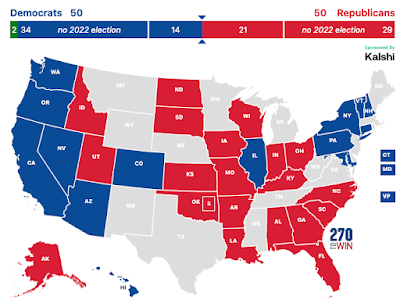"The Letter After Your Name" on Virginia Ballots (Post 2 of 2)
Earlier, I posted a "GIF History" of ballot laws in the United States. If you don't have the patience to sit through a 45 second GIF, the key takeaway is that Virginia was the last state in the nation to apply party labels to its ballots in 2000. This post will examine the effects of that reform, taken from my MPSA paper (.pdf).
There's two primary effects of party labels on ballots.
There's two primary effects of party labels on ballots.
 |
| Fig. 1 - Precinct Vote Shares for President (2000) and VA House |
- Participation: Even when someone goes to the polls, not everyone votes in every election. When the party labels got on the ballot, Virginia voters became more likely to vote in down-ballot elections like the VA Senate and House of Delegates. This is because voting is like an SAT test (paper), and voters are likely to skip a question when they don't know the answer. The party labels gave some voters that confidence, so they were more likely to participate in this races. In the Virginia case, roll-off dropped by about 15-20 percent for down-ballot races.
- Partisan Voting: In the paper, I report a Virginia legislator as saying: "If the only way we know how to vote is by the letter after your name, they're not a very informed electorate". The fact is that some voters probably had no idea which candidate was of their party, so after the reform went into effect they voted with their party. (They could also serve as a reminder to everyone). I show this using George W. Bush's vote share as the normal partisan vote share for each precinct, and after the policy reform the vote shares in the state-level races associated more closely with it. We see the effect in Figure 1. The dashed darker line shows how after the reform, the slope is higher.
So what does it mean?
In the short-run, the reform worked for the Republicans in the Virginia legislature. They did very well in the 2001 and 2003 elections.
But if we think about how it matters for democracy more generally, the results are mixed.
Having more people vote in down-ballot races is a good thing. My dissertation will look at how policies at the state level matter. So this reformed broadened and deepened the process.
However, if the reform just resulted in blind-party voting, it may not have benefited the health of Virginian democracy as it could make legislators less accountable in elections.
Ultimately, the findings in the paper matter because this issue of partisan vs. non-partisan elections is an open issue in judicial elections and municipal elections in many states.
Ultimately, the findings in the paper matter because this issue of partisan vs. non-partisan elections is an open issue in judicial elections and municipal elections in many states.

